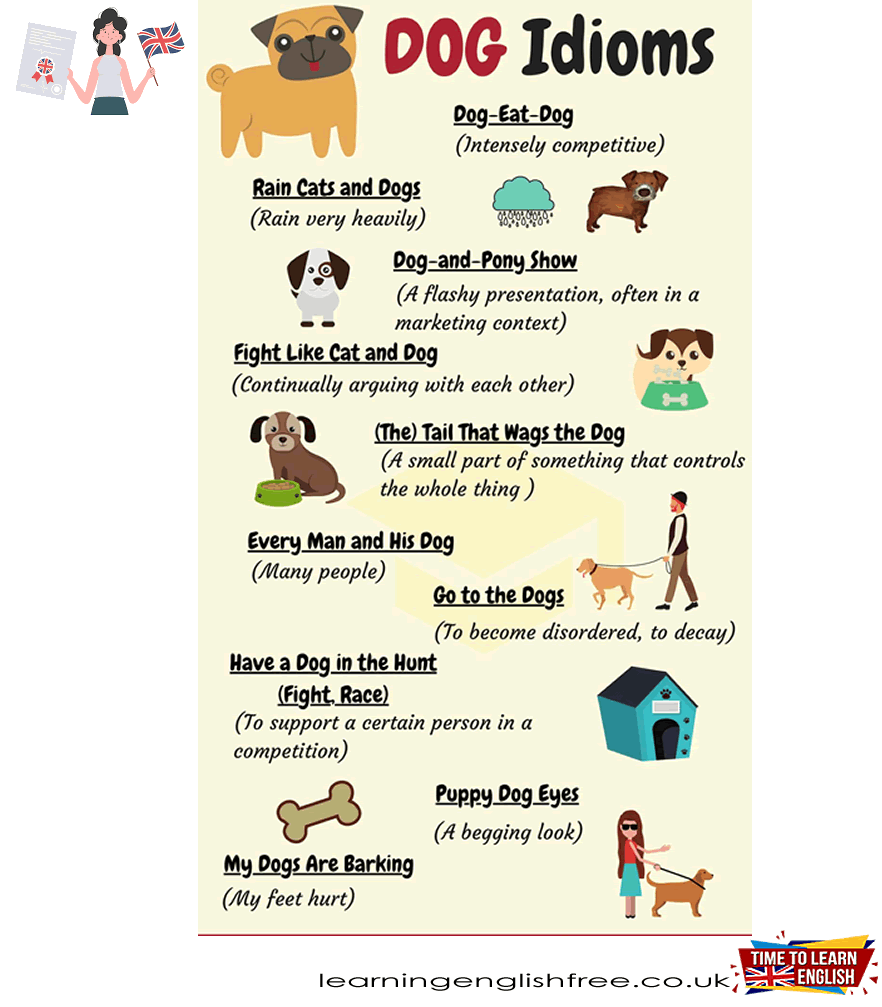
Unravelling the Fun World of Dog Idioms
Learning the Ropes of Dog-Related Expressions
Welcome to 'Barking Up the Right Tree', a unique and engaging lesson designed to help you understand and use dog idioms in English. Dog idioms are a fun and interesting part of the English language, often used to express complex ideas in a few words. This lesson is perfect for English learners who wish to enhance their conversational skills and understand English expressions better.
Learning Objectives:
- Understand the meanings of various dog-related idioms.
- Learn how to use these idioms in everyday conversation.
- Appreciate the cultural significance and fun aspect of idioms in the English language.
Part 1: Unleashing Dog Idioms – Meanings and Examples
-
Dog-Eat-Dog
- Meaning: Intensely competitive or ruthless.
- Example: "The business world can be dog-eat-dog, where only the strongest survive."
-
Rain Cats and Dogs
- Meaning: Rain very heavily.
- Example: "We had to cancel the picnic because it was raining cats and dogs."
-
Dog-and-Pony Show
- Meaning: A flashy presentation or performance, often used in a marketing context to impress.
- Example: "The company's product launch was just a dog-and-pony show to attract investors."
-
Fight Like Cat and Dog
- Meaning: Continually arguing or fighting with each other.
- Example: "My siblings and I used to fight like cat and dog when we were younger."
Part 2: More Dog Idioms – Meanings and Examples
-
The Tail That Wags the Dog
- Meaning: A small or unimportant part of something controlling the whole.
- Example: "In this situation, it seems like the tail is wagging the dog – the minor details are dictating the entire project."
-
Every Man and His Dog
- Meaning: A large number of people.
- Example: "Every man and his dog was at the concert, making it a huge success."
-
Go to the Dogs
- Meaning: To become disordered, deteriorate, or decay.
- Example: "The neighbourhood has gone to the dogs since that company closed down."
-
Have a Dog in the Hunt
- Meaning: To support a certain person or outcome in a competition or dispute.
- Example: "I don't have a dog in this hunt, so I'm not concerned about the outcome."
-
Puppy Dog Eyes
- Meaning: A begging or pleading look, resembling the innocent eyes of a puppy.
- Example: "He gave me those puppy dog eyes, and I couldn't resist giving him another treat."
-
My Dogs Are Barking
- Meaning: A colloquial way to say one's feet are hurting.
- Example: "After walking all day in the city, my dogs are barking!"
What We've Learnt from Dog Idioms
-
Recap of Idioms: We have explored various dog idioms, learning their meanings and how they are used in everyday language. These idioms add colour and fun to our conversations, making English a vibrant and expressive language.
-
Key Phrases and Idioms: Remember phrases like 'dog-eat-dog', 'rain cats and dogs', and 'puppy dog eyes'. These expressions are not only useful but also common in English conversations.
-
Memory Tips: To better remember these idioms, try creating flashcards, drawing pictures related to each idiom, or making mind maps. Place stick-it notes with an idiom on objects around your home to practice.
-
Real-Life Application: Listen for these idioms in movies, songs, and conversations. Try using them in your discussions to enhance your English fluency.
-
Sharing and Further Learning: Share what you've learnt with friends and visit our Facebook page at www.facebook.com/learningenglishfree.co.uk for more engaging English lessons. We look forward to hearing your feedback and experiences with these idioms!
